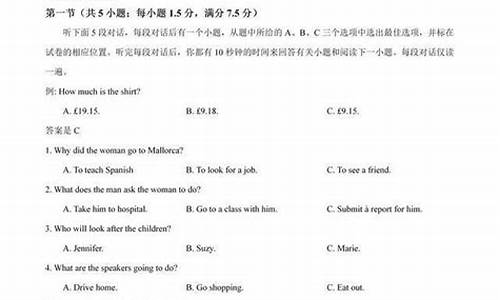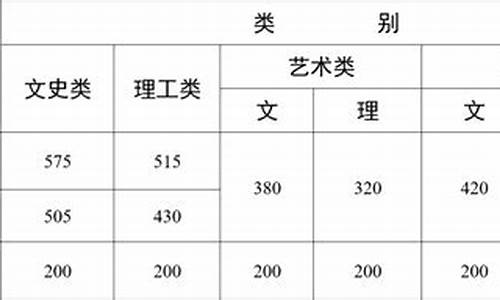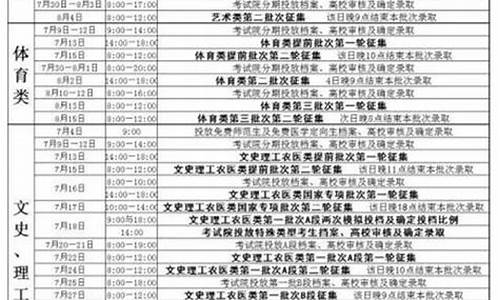2017浙江英语高考真题_2017浙江高考英语试卷答案详解
1.2017年高考试题全国各个省试题都一样吗
2.浙江高考英语阅读题附答案

高中文理综合合集百度网盘下载
链接:提取码:1234
简介:高中文理综合优质资料下载,包括:试题试卷、课件、教材、视频、各大名师网校合集。
2017年高考试题全国各个省试题都一样吗
基本上有三种渠道:
1、在当当网或亚马逊上输入:英语应用能力考试A级真题纸卷,马上就能搜索出很多有关真题解析
的书,有的还配有光盘,也不贵,大多数都在20元一下。
2、沪江英语网或王迈迈英语网有部分真题可以下载。
3、向任课的英语老师求要,他们通常都会有这些材料的。
就我个人的经验,还是老老实实买本书看,比较好方便。以前我也在网上下载过,网上错误比较多,有时,一套卷子还要分几个部分下载,挺麻烦的。
浙江高考英语阅读题附答案
不一样,试卷选用情况如下:
全国I卷(全国乙卷):河南、河北、山西、安徽、湖北、湖南、江西、广东、福建、山东(注:2017年山东省仅英语、综合两科使用全国卷,语文、数学两科仍自主命题)
全国II卷(全国甲卷):黑龙江、吉林、辽宁、内蒙古、宁夏、甘肃、新疆、青海、西藏、陕西、重庆、海南(注:2017年海南省仅语文、数学、英语三科使用全国卷,物理/政治、化学/历史、生物/地理三科仍使用教育部为其单独命题的分科试卷)
全国III卷(全国丙卷):贵州、广西、云南、四川
自主命题:北京、天津、江苏、浙江、上海、山东(仅语文、数学两科)。
扩展资料不得参加高考的情形:
(1)具有高等学历教育资格的高校的在校生;或已被高等学校录取并保留入学资格的学生;
(2)高级中等教育学校非应届毕业的在校生;
(3)在高级中等教育阶段非应届毕业年份以弄虚作假手段报名并违规参加普通高校招生考试(包括全国统考、省级统考和高校单独组织的招生考试)的应届毕业生;
(4)因违反国家教育考试规定,被给予暂停参加普通高校招生考试处理且在停考期内的人员;
(5)因触犯刑法已被有关部门采取强制措施或正在服刑者。
百度百科——2017年普通高等学校招生全国统一考试
浙江高考英语阅读精选题附答案
阅读能力是浙江高考英语考察的重要英语能力,提高英语阅读能力十分重要。下面我为大家带来浙江高考英语阅读精选题,欢迎同学们阅读练习。
浙江高考英语阅读精选题(一)
I was due to take my driving test at 11:30 am.It was a rainy morning with low clouds and as I approached the driving school at 9:50 am,my heart sank.My driving instructor. Stan,said something,trying to drive away my fears,but I was not impressed
We set off for the test centre with an hour to go I wanted a run round the test circuit (圈),but we got stuck in a traffic jam,and could only drive no faster than walking.
We arrived at the test centre at 11 am.Stan made me watch a group of six learners emerging from the building with their respective(各自的)examiners.Their instructors were looking out from two windows.We watched them drive off They must have been feeling very nervous
Stan took me round the probable test track,pointing out the traps.The weather became even worse It seemed to make me feel worse too.I had developed a couldn't-care-less mood,and was almost calm We returned to the test centre in time to see the six unfortunates returning.Their nerves must have been in a terrible state.
I sat in the waiting room until six examiners came in to call out our respective names. Mine showed no emotion as he asked me to go to my car I showed none either,but the tension began mounting again.
1.On their way to the test center,Stan tried to comfort the author_________
A.but it made the author's heart sink deeper
B.but the words produced no effect
C.so that the author could drive to the center with no fears
D.so that they could prepare for all he flaps
2.Which of the following is TRUE according to the passage?
A.Six learners would be tested at the same time.
B.The learners were tested in the presence of their instructors
C.None of the six learners passed the test in the end.
D The instructors were as nervous as the learners
3.When the author was sitting in the waiting room,he was quite_________
A.upset B.nervous C.frightened D.relaxed
4.When it was his turn to take the test,the author went to his car with___________
A.firm confidence B mixed emotions C.increased nervousness D.perfect calmness
5.The passage is mainly about___________
A.the influence of bad weather upon a test taker
B the feelings of a learner before his driving test
C the preparations before a driving test
D.an unforgettable day
浙江高考英语阅读精选题答案
1.B
2.A
3.D
4.C
5.B
浙江高考英语阅读精选题(二)The evidence for harmony may not be obvious in some families. But it seems that four out of five young people now get on with their parents, which is the opposite of the popularly-held image(形象)of unhappy teenagers locked in their room after endless family quarrels.
An important new study into teenage attitudes surprisingly shows that their family life is more harmonious than it has ever been in the past."We were surprised by just how positive today's young people seem to be about their families," said one member of the research team. "They're expected to be rebellious(叛逆的)and selfish, but actually they have other things on their minds: they want a car and material goods, and they worry about whether school is serving them well. There's more negotiation(商议)and discussion between parents and children, and children expect to take part in the family decision-making process. They don't want to rock the boat."
So it seems that this generation of parents is much more likely than parents of 30 years ago to treat their children as friends."My parents are happy to discuss things with me and willing to listen to me," says 17-year-old Daniel Lazall. "I always tell them when I'm going out clubbing. As long as they know what I'm doing, they're fine with it." Susan Crome, who is now 21, agrees. "Looking back on the last 10 years, there was a lot of what you could call negotiation. For example, as long as I'd done all my homework, I could go out on a Saturday night. But I think my grandparents were a lot stricter with my parents than that."
Maybe this positive view of family life should not be unexpected. It is possible that the idea of teenage rebellion is not rooted in real facts. A researcher comments,"Our surprise that teenagers say they get along well with their parents comes because of a brief period in our social history when teenagers were regarded as different beings. But that idea of rebelling and breaking away from their parents really only happened during that one time in the 1960s when everyone rebelled. The normal situation throughout history has been a smooth change from helping out with the family business to taking it over."
1.What is the popular image of teenagers today?
A.They worry about school.
B.They dislike living with their parents.
C.They have to be locked in to avoid troubles.
D.They quarrel a lot with other family members.
2.The study shows that teenagers don't want to__________ .
A.share family responsibility
B.cause trouble in their families
C.go boating with their family
D.make family decisions
3.Compared with parents of 30 years ago, today's parents__________ .
A.go to clubs more often with their children
B.are much stricter with their children
C.care less about their children's life
D.give their children more freedom
4.According to the author, teenage rebellion__________ .
A.may be a false belief
B.is common nowadays
C.existed only in the 1960s
D.resulted from changes in families
5.What is the passage mainly about?
A.Negotiation in family.
B.Education in family.
C.Harmony in family.
D.Teenage trouble in family.
浙江高考英语阅读精选题答案
1.D
2.B
3.D
4.A
5.C
;声明:本站所有文章资源内容,如无特殊说明或标注,均为采集网络资源。如若本站内容侵犯了原著者的合法权益,可联系本站删除。












